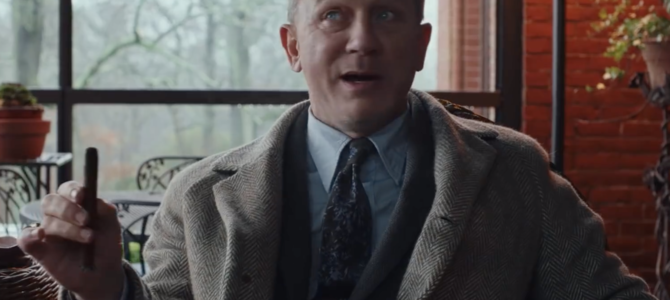
Light spoilers ahead.
There’s a new whodunnit in theaters this holiday season: “Knives Out.” That’s welcome news in itself. The genre is a rare bird in theaters these days, generally relegated to Netflix or laundered onto PBS via shows that originated on British television. 2017’s “Murder on the Orient Express” was a welcome gesture, but suffered from an over-familiar storyline and a certain stiffness in its bones. “Knives Out,” in contrast, is inventive, entertaining, surprisingly political, and not without an emotional tug.
The movie opens with a shot of a Gothic, gabled country house, accompanied by a creepy plinking violin that foreshadows the trouble to come. So far, so Agatha Christie. But there are a few kinks in this familiar presentation: We’re not in 1930s England but modern-day Massachusetts. There is no butler, but there is a housekeeper, who discovers a body in the first scene, and we’re off.
Flashback to a couple of days earlier. It’s the birthday of 85-year-old mystery writer and wealthy patriarch Harlan Thrombey, and his family has gathered at the dark and rambling homestead, crammed with mementoes from his fabulous career, including a fabulous collection of knives (foreshadowing, anyone?) arranged “Game of Thrones”-style. The housekeeper finds him the next morning with his throat slit, and although the initial conclusion is suicide, you know it won’t be that simple. In “Knives Out,” things gets very complicated indeed.
Enter Daniel Craig as Benoit Blanc, an eccentric detective with a Foghorn Leghorn accent and flowery manner. Craig disappeared so deeply into this Southern stereotype that I didn’t think of James Bond a single time.
Director Rian Johnson lassoed some serious acting talent to fill out the suspect list. Renowned 89-year-old actor Christopher Plummer portrays patriarch Harlan Thrombey in flashback before his suspicious death. Jamie Lee Curtis is his no-nonsense real estate mogul daughter Linda, and her put-upon husband Richard is played with a surprisingly light touch by Don Johnson of “Miami Vice” fame. Chris Evans, a.k.a. Captain America, is obnoxiously sweatered rebel grandson Hugh, a.k.a. “Ransom,” Harlan’s sentimental favorite.
Harlan’s caregiver Marta Cabrera, played by Cuban actress Ana de Armas, has a cinematically convenient condition that makes her regurgitate when she tells a lie, making her a potentially priceless Watson to Blanc’s self-styled Sherlock. But she has secrets of her own.
Johnson’s involvement (he both wrote the screenplay and directed) may be surprising, given that he performed the same duties in 2017’s divisive entry of the Star Wars canon, “The Last Jedi.” But changing genres seems to have liberated Johnson, who finds new notes to pluck off the dusty old violin.
“Knives Out” is enjoyably creaky, with a “Clue” vibe (a debt acknowledged in the dialogue), and a wide streak of dark humor. The theme of a nasty, overprivileged family puts one in mind of the recent horror movie “Ready or Not,” but with a deeper investment in character.
The multiple switchbacks, and the prospect of good people doing bad things—and vice versa, for complicated reasons—make for a convoluted puzzler that’s both densely plotted and boisterous, especially when it shifts into thriller gear featuring “the dumbest car chase ever.” The twists come where you may not expect them, and the nature of the mystery itself shifts as we go. The story works up some menace in the third ac—including, naturally, the reading of the will—as we began to make out the (literally) shadowy outlines of the solution, the mystery suffering only a little from a narrow range of likely suspects.
“Knives Out” is also surprisingly political. The entitled family is seen before Thrombey’s death engaging in diatribes about “kids in cages” and “America is for Americans.” One grandchild is a pale alt-right “creep,” while another is a “social justice warrior” whose selflessness doesn’t apply to her worries about paying for tuition to Smith College. A running joke is that they don’t know which Latin American country the character Marta is actually from.
“Knives Out” was clearly a labor of love for Johnson, who worked on the story for a decade. The virtues of that slow cooking are evident in the screenplay, a tight black box of fair clues that all click into place by the ending, which makes excellent use of the Rolling Stones’ song “Sweet Virginia.”
There are a few flaws in this polished diamond. Some of the dialogue comes off as less clever than arch, the political stuff feels extraneous, and some of the motivations for the mayhem wouldn’t stand up in the court of common sense. But those aren’t fatal wounds. (Get it?) With strong reviews and word of mouth, “Knives Out” will hopefully stick around in the theaters through the season.









